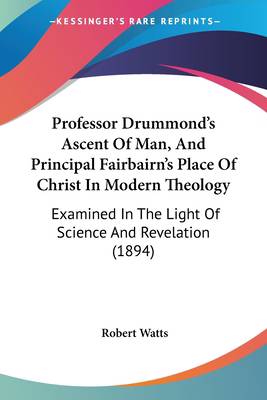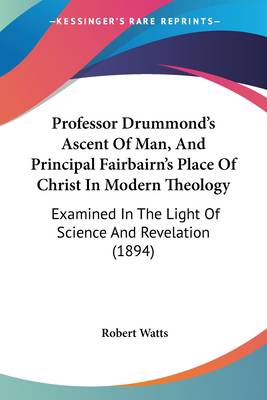
- Retrait gratuit dans votre magasin Club
- 7.000.000 titres dans notre catalogue
- Payer en toute sécurité
- Toujours un magasin près de chez vous
- Retrait gratuit dans votre magasin Club
- 7.000.0000 titres dans notre catalogue
- Payer en toute sécurité
- Toujours un magasin près de chez vous
Professor Drummond's Ascent Of Man, And Principal Fairbairn's Place Of Christ In Modern Theology
Examined In The Light Of Science And Revelation (1894)
Robert Watts
Livre broché | Anglais
33,95 €
+ 67 points
Format
Description
Professor Drummond's Ascent of Man, and Principal Fairbairn's Place of Christ in Modern Theology: Examined in the Light of Science and Revelation is a book written by Robert Watts in 1894. The book is a critical analysis of two prominent works of the time, namely ""The Ascent of Man"" by Professor Henry Drummond and ""The Place of Christ in Modern Theology"" by Principal A. M. Fairbairn. Watts examines the ideas presented in these works from a scientific and theological perspective, bringing to light the inconsistencies and flaws in their arguments. He argues that science and revelation are not mutually exclusive, but rather they complement each other in understanding the nature of man and the role of Christ in modern theology.The book is divided into two parts. The first part deals with Professor Drummond's ""The Ascent of Man"" and focuses on the idea of evolution and its impact on theology. Watts argues that while evolution is a scientific fact, it does not negate the existence of God or the role of Christ in human history.The second part of the book examines Principal Fairbairn's ""The Place of Christ in Modern Theology"" and its implications for the modern church. Watts critiques Fairbairn's view that Christ is simply a moral example and argues that Christ's divinity and atonement are essential to understanding the Christian faith.Overall, Professor Drummond's Ascent of Man, and Principal Fairbairn's Place of Christ in Modern Theology: Examined in the Light of Science and Revelation is a thought-provoking book that challenges the ideas of its time and offers a fresh perspective on the relationship between science and religion.This scarce antiquarian book is a facsimile reprint of the old original and may contain some imperfections such as library marks and notations. Because we believe this work is culturally important, we have made it available as part of our commitment for protecting, preserving, and promoting the world's literature in affordable, high quality, modern editions, that are true to their original work.
Spécifications
Parties prenantes
- Auteur(s) :
- Editeur:
Contenu
- Nombre de pages :
- 162
- Langue:
- Anglais
Caractéristiques
- EAN:
- 9781120863836
- Date de parution :
- 29-01-10
- Format:
- Livre broché
- Format numérique:
- Trade paperback (VS)
- Dimensions :
- 152 mm x 229 mm
- Poids :
- 226 g

Les avis
Nous publions uniquement les avis qui respectent les conditions requises. Consultez nos conditions pour les avis.






